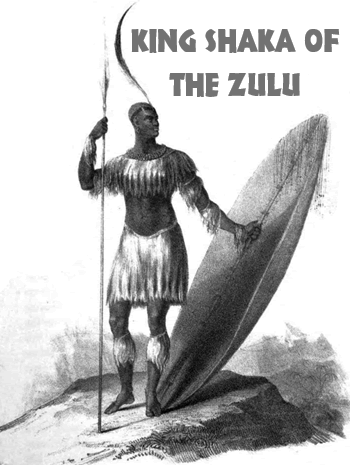 King Shaka of the Zulu, born around 1787, was a transformative and formidable leader whose innovations and military strategies profoundly shaped the history of Southern Africa. Shaka, the illegitimate son of Senzangakhona, a minor Zulu chief, and Nandi, faced significant challenges during his early life, including ostracism and hardship. Despite these obstacles, he rose to power and united numerous fragmented Nguni-speaking clans into the formidable Zulu Kingdom.
King Shaka of the Zulu, born around 1787, was a transformative and formidable leader whose innovations and military strategies profoundly shaped the history of Southern Africa. Shaka, the illegitimate son of Senzangakhona, a minor Zulu chief, and Nandi, faced significant challenges during his early life, including ostracism and hardship. Despite these obstacles, he rose to power and united numerous fragmented Nguni-speaking clans into the formidable Zulu Kingdom.
Shaka's ascent began in 1816 when he became the chief of the Zulu after his father's death. He quickly implemented radical reforms that revolutionized the Zulu military and society. Shaka restructured the traditional army, introducing rigorous training, strict discipline, and innovative tactics. He replaced the traditional long-throwing spear with the shorter, more lethal stabbing spear, or iklwa, which forced warriors to engage in close combat. Additionally, Shaka developed the "bull horn" formation, a tactical maneuver where the main force (the "chest") would engage the enemy head-on while the "horns" would encircle and attack from the flanks, leading to decisive victories.
Shaka's military campaigns expanded the Zulu territory significantly. He employed both diplomacy and force, incorporating conquered tribes into his kingdom and fostering a sense of unity and Zulu identity. His leadership and strategic brilliance made the Zulu Kingdom the dominant power in southeastern Africa. However, his reign was also marked by brutality and ruthlessness, as Shaka maintained strict control and demanded absolute loyalty.
 Shaka's impact extended beyond his military conquests. He centralized the administration, standardizing laws and customs, which helped solidify the Zulu identity. His reign saw the rise of a strong, cohesive state capable of resisting colonial encroachment for years.
Shaka's impact extended beyond his military conquests. He centralized the administration, standardizing laws and customs, which helped solidify the Zulu identity. His reign saw the rise of a strong, cohesive state capable of resisting colonial encroachment for years.
In 1828, Shaka was assassinated by his half-brothers Dingane and Mhlangana, who feared his increasingly erratic behavior and oppressive rule. Despite his controversial legacy, Shaka's influence on Zulu society and Southern African history is undeniable. His military innovations and state-building efforts left an indelible mark, shaping the region's dynamics and resistance to European colonization.
King Shaka remains a complex and pivotal figure in African history, remembered both for his unifying achievements and the fierce methods he employed to achieve them. His legacy continues to be celebrated in South African culture and history as a symbol of strength, resilience, and leadership.
|
 King Shaka of the Zulu, born around 1787, was a transformative and formidable leader whose innovations and military strategies profoundly shaped the history of Southern Africa. Shaka, the illegitimate son of Senzangakhona, a minor Zulu chief, and Nandi, faced significant challenges during his early life, including ostracism and hardship. Despite these obstacles, he rose to power and united numerous fragmented Nguni-speaking clans into the formidable Zulu Kingdom.
King Shaka of the Zulu, born around 1787, was a transformative and formidable leader whose innovations and military strategies profoundly shaped the history of Southern Africa. Shaka, the illegitimate son of Senzangakhona, a minor Zulu chief, and Nandi, faced significant challenges during his early life, including ostracism and hardship. Despite these obstacles, he rose to power and united numerous fragmented Nguni-speaking clans into the formidable Zulu Kingdom.  Shaka's impact extended beyond his military conquests. He centralized the administration, standardizing laws and customs, which helped solidify the Zulu identity. His reign saw the rise of a strong, cohesive state capable of resisting colonial encroachment for years.
Shaka's impact extended beyond his military conquests. He centralized the administration, standardizing laws and customs, which helped solidify the Zulu identity. His reign saw the rise of a strong, cohesive state capable of resisting colonial encroachment for years. 







